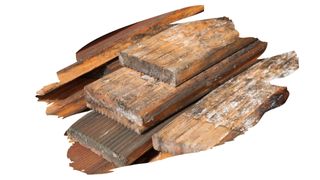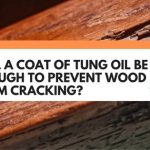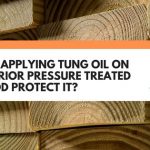Mold growth is one of the most frequent problems that crops up when it comes to exterior wood. All of that rain, humidity, and even the moisture of morning dew, can cause woods natural material to decay.
So, this is where a quality sealant comes in.
By coating and sealing the surface of wood, we can prevent water from dampening those wood fibers. And without a damp environment to thrive in, mold bacteria never get a chance to grow inside timber.
But, is tung oil waterproof enough to prevent mold from growing on your outdoor decking or roof?
Well, in this post, you will learn exactly why mold grows on wood — and the simple way to stop bacteria from making a home in outdoor decking. You will also discover what a microporous wood finish is — and why it matters when it comes to Tung oil’s ability to waterproof wood.
And keep reading to discover which low maintenance wood sealer is the best at protecting exterior wood from damp and decay.

This post may contain affiliate links to products that we receive a commission for (at no additional cost to you). Learn more here.
So How Do You Really Prevent Mold From Growing On Wood?
Mold bacteria thrive in damp conditions, and they love to feed on decaying plant life.
So, when moisture or condensation soaks into natural solid wood, it creates the perfect environment for bacteria to grow.
Basically, if you want to prevent mold, you need to stop wood from becoming damp. Which should be simple enough, right? Well, it all depends on what kind of wood finish you’re using to seal the surface of wood.
Is Tung Oil Good For Sealing And Waterproofing Wood?
Not quite. You see, Tung oil isn’t waterproof. At best, it’s simply a very water-repellent wood finish.
Due to the microporosity of a Tung oil film, this finish can only really stop water droplets from soaking past it. However, as a microporous wood finish, it won’t be able to block condensation or vapor, such as steam.
So, Tung oil is not a good finishing coat if you want to safeguard wood from severe water damage. You’re better off coating wood with a urethane-based topcoat, (such as polyurethane), if you want a truly waterproof sealer.
What Is A Microporous Finish? A microporous wood finish is water resistant enough to prevent liquid from passing it. But, water vapor will easily pass through this type of finish. Which is why placing a steaming cup of coffee on a microporous finish can damage these finishes.
Is Tung Oil At Least Mold Resistant?
The finish itself does not encourage the growth of mold or mildew (unlike Raw Linseed oil). But pure Tung oil doesn’t contain fungicides, (or any other kind of chemical biocides). So, there’s nothing in this oil finish that can kill off mold bacteria.
However, this is only true of pure Tung oil.
You see, many of the Tung oil products sold at local hardware stores, aren’t pure Tung oil. Quite a few don’t even contain any Tung oil at all.
Instead, these not-Tung oil products are more of a type of Teak oil. Far from being wholly natural, these not-Tung oil finishes blend solvents and thinners with Linseed or Tung oil.
Now, some of these not-Tung oil products may contain anti-bacterial fungicide additives. Goodness only knows.
And as there’s no industry standard to not-Tung oils, you’ll need to check their label to be sure.
How Long Does Tung Oil Take To Cure? It takes around 30 days for pure Tung oil to cure into a hard durable resin coat — depending on room temperature.
So That’s Tung Oil Crossed Off The List…What Can I Use To Waterproof Wood Instead?
Any urethane-based top coating wood sealer, (ideally one that also contains mildew-resistant additives), is your best option.
For interior wood, a water-based or oil-based polyurethane sealer is a fantastic option. This sealant will dry quickly and requires very little maintenance.
But, for exterior wood, use a Spar Urethane product. Sometimes known as Yacht Varnish, this sealant is the most waterproofing finish you can get your hands on.
Related Post: How To Keep Your Landscape Timbers From Ever Warping Again
Typically used on marine boats, Spar urethane is a set-and-forget sealant. And you need only reapply it once or twice every 10 years.
What’s more, Spar Urethane is a sealer that’s specifically designed for the great outdoors. So, it contains mildew-resistant additives, which help this sealant fend off mold growth.
You can learn more about Spar Urethane (and its fantastic water-resistance) by checking out our post: Can You Use Polyurethane On Tree Bark Decorations?
However, one key thing to note about urethane sealers is their appearance after they’ve dried.
Urethane-based finishes can leave wood looking like it’s been vacuum-sealed in a thin sheet of clear plastic. Having said that, a penetrating oil-based polyurethane will leave behind a more natural looking finish than water-based poly’s.
To Wrap Up, Here Are The 3 Key Takeaways From This Post…
- 1). Tung oil does not encourage mold growth…but it doesn’t prevent it either. This is because pure Tung oil does not contain antibacterial additives.
- 2). Tung oil is a slow-drying slow-curing wood finish. It can take Tung oil up to 30 days to wholly cure.
- 3). If you want a waterproof wood finish, then use a urethane-based wood sealer instead. For interior wood, a polyurethane sealant will work great. But, for exterior wood, Spar Urethane is better at both waterproofing and preventing mold growth on wood.



